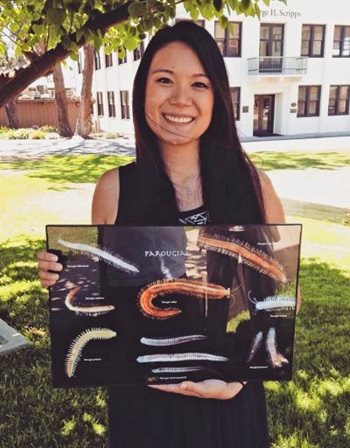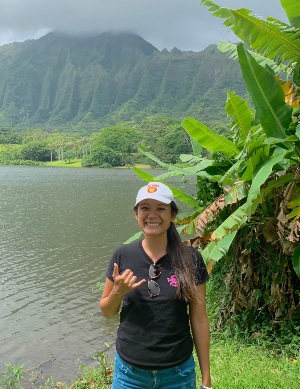2 September 2021
New Marine Science Program Empowers Teens to Become Stewards of the Ocean
By Jennifer McEntee
 Nicole Yen grew up in the San Francisco Bay Area, moved to coastal San Diego for college and studied marine biology abroad in Australia. She has always been interested in animal research but felt a particular calling from the depths of the ocean.
Nicole Yen grew up in the San Francisco Bay Area, moved to coastal San Diego for college and studied marine biology abroad in Australia. She has always been interested in animal research but felt a particular calling from the depths of the ocean.
As a graduate student researcher at UC San Diego's Scripps Institution of Oceanography, her thesis involved using molecular genetic tools to examine ecological and evolutionary questions in deep-sea habitats. Her research projects have included work with the San Diego Zoo and Birch Aquarium.
Now a science educator, Yen tries to impart that same sense of wonder and ocean stewardship to her students. Whether it's explaining the importance of salt marshes to prevent coastal flooding or of coral reefs as biologically diverse ecosystems, Yen guides students to understand how stressors like pollution can affect a multitude of environs.
"I don't think people realize how connected the ocean is to everything," she says. "It's a complicated web."
Now Yen teaches a series of Marine Science classes for the UC San Diego Extended Studies Research Scholars program. She says the classes are a natural evolution of her five years as a Pre-College programs instructor.
"This is something I'm really excited about," says Yen. "The classes are foundational to give students a strong background knowledge and show them where they can apply that knowledge."
Global leader in marine science
UC San Diego's proximity to the Pacific Ocean has long made it a prominent institution for marine biology curriculum. Scripps Institution is at the forefront of global earth science research and education.
"We've taught marine science courses in other programs, and there's always a huge demand," says Maysoon Dong, an associate director for the UCSD Extended Studies Education and Community Outreach (ECO) department.
It helps that Yen is so earnest about ocean-focused academics. "Literally no one is more passionate about marine science than Nicole Yen," Dong says.
The Research Scholars program gives high school students unique access to UC San Diego's research resources in bioengineering, life sciences, medicine, design thinking, and now, marine science.
By expanding the university's marine science studies to ninth-through-12th grade students, Research Scholars is ushering in the next generation of environmental advocates, Dong says, adding, "This could make a big difference for their future."
Real-world research
Three foundational courses – Introduction to Marine Science, Principles of Organismal Biology, and Marine Biodiversity: Coral Reef Ecology and Conservation – are offered in fall. Classified as Tier 1 classes, they provide a combination of weekly synchronous and asynchronous classwork.
A slate of Tier 2 and Tier 3 Marine Science classes – which will advance students to oceanographic research and scientific writing – are coming soon. In those more advanced classes, students will partner with active researchers to design and run their own projects on topics such as animal physiology, thermodynamics and fisheries science.
scientific writing – are coming soon. In those more advanced classes, students will partner with active researchers to design and run their own projects on topics such as animal physiology, thermodynamics and fisheries science.
"I hope they understand that this is really not a one-class-and-done situation," Dong says. "It's a progression to learning how to do research and manuscripts in scientific writing. One of my goals is to get kids thinking about what their passion is. The more exposure students have, they're going to get their college path right the first time."
The coursework is crafted to be immersive with real-world applications. Though current coronavirus protocols mean the classes are all online, the lectures are interactive, with guest speakers and collaborative labs and discussions. Instructors encourage students to work together and individually to enhance their problem-solving, creative thinking, communication and collaboration skills.
Students can then use those skills to make informed decisions about their future vocations, earn pre-college credits and be more competitive in college and internship applications.
Building on the basics
It doesn't matter if the high school students have never taken a marine biology class before or if they're already doing high-caliber research. The Research Scholars classes start with a broad overview of ocean sciences, then progress as far as publishing research in a scientific journal, Yen says.
Ideally, students will come away from these classes with greater critical thinking skills and a deeper understanding of the ocean's vital place in our ecosystem, Yen says.
"For students who are interested in this field, it's so rare to get this kind of hands-on research experience," she says. "Getting the real experience is so valuable to see if it's something they could see themselves doing in college or as a career."
Yen says she works to make sure high school students participate directly in scientific research and writing, rather than just doing backend work for other researchers. She also wants to introduce students to working scientists of all backgrounds and orientations to visualize themselves in those roles.
"Scientists can be anyone. I want them to see, 'I can be a scientist, too,'" she says.
Learn more about Research Scholars Marine Science classes and apply for the program today to save a seat. Scholarships may be available; contact the department for more information.